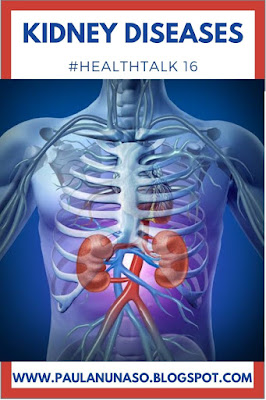#HEALTHTALK 16: What you need to know about Kidney disease
Every human being, at birth, has two kidneys. It is a bean-shaped organ of the body located in the retroperitoneal space around the diaphragm.
Kidney is the main excretory organ of the body. It has nephrons which filter the blood to remove wastes like urea, waste salts, uric acid, etc.
Healthy kidneys filter about a half cup of blood every minute, removing wastes and extra water to make urine. The urine flows from the kidneys to the bladder through two thin tubes of muscle called ureters, one on each side of your bladder.
Your bladder stores urine. Kidneys, ureters, and bladders are part of the urinary tract.
And the urine we excrete will have been stored in the bladder for anywhere from 1 to 8 hours.
Another important thing about the kidney is that it helps to maintain mineral homeostasis. That is, balance of minerals in the body.
Your kidneys also make hormones that help control your blood pressure, make red blood cells, and keep your bones strong and healthy.
How to know the health status of your kidneys
Before you can be sure that your kidney is healthy, you must have subjected your kidney to what is called KIDNEY FUNCTION TEST.
The kidney function test is done to know the level of blood cells, ketone bodies, amino acids, etc in the urine. In addition, the level of urea, creatinine, electrolytes, uric acid, etc in the blood is also used to assess the kidney.
Kidney disease kills gently over a long period of time. The symptoms can be like those of other common diseases and infections, but the later damages are usually grave.
Signs of kidney problem
- You're more tired, have less energy or are having trouble concentrating.
- You have trouble trying to sleep.
- Dry and itchy skin.
- Urination is often.
- Blood is present in the urine.
- Foamy Urine.
- You're experiencing persistent puffiness around your eyes.
- Your ankles and feet are swollen.
- Poor appetite.
- Muscle cramps.
Having a single symptom does not suggest something serious. But if you are having more than one simultaneously, then you should see your doctor and get tested early in order to ascertain that your kidneys are working properly.
According to the bulletin of the World Health Organization (2018), kidney disease has numerous complex causes.
It has an indirect impact on global morbidity (disease rate) and mortality (death rate) by increasing the risks associated with at least five other major killer diseases: cardiovascular diseases, diabetes, hypertension, infection with human immunodeficiency virus (HIV) and malaria.
Did you know that, the Global Burden of Disease (GBD) 2015 study estimated that 1.2 million deaths, 19 million disability-adjusted life-years (DALYs) and 18 million years of life lost from cardiovascular diseases were directly attributable to reduced glomerular filtration rates?
A 2015 study on the global burden of diseases also estimated that in 2015, 1.2 million people died from kidney failure, an increase of 32% since 2005. In 2010, an estimated 2.3–7.1 million people with end-stage kidney disease died without access to chronic dialysis.
Additionally, it is estimated that each year, around 1.7 million people are thought to die from acute kidney injury. An estimate of 5–10 million people die annually from kidney disease.
However, the limited epidemiological data, common lack of awareness, and the frequently poor access to laboratory services have probably underestimated the true burden posed by kidney diseases.
There are four major diseases of the kidney, different types of kidney function tests, as well as early treatment methods. These will be our focus in the next edition of #HealthTalk. Please keep a date with us next week Thursday.
Lilian Eze is a Nutritionist-Dietitian and teacher in Lagos, Nigeria. She is also a Lead Content Creator at The Paul Anunaso Blog, and can be reached at lilian.thepaulanunasoblog@gmail.com
Chisom Deborah Ogbonna is a Biologist in Lagos, Nigeria, and is a lead contributor to the #HealthTalk series.



Comments
Post a Comment